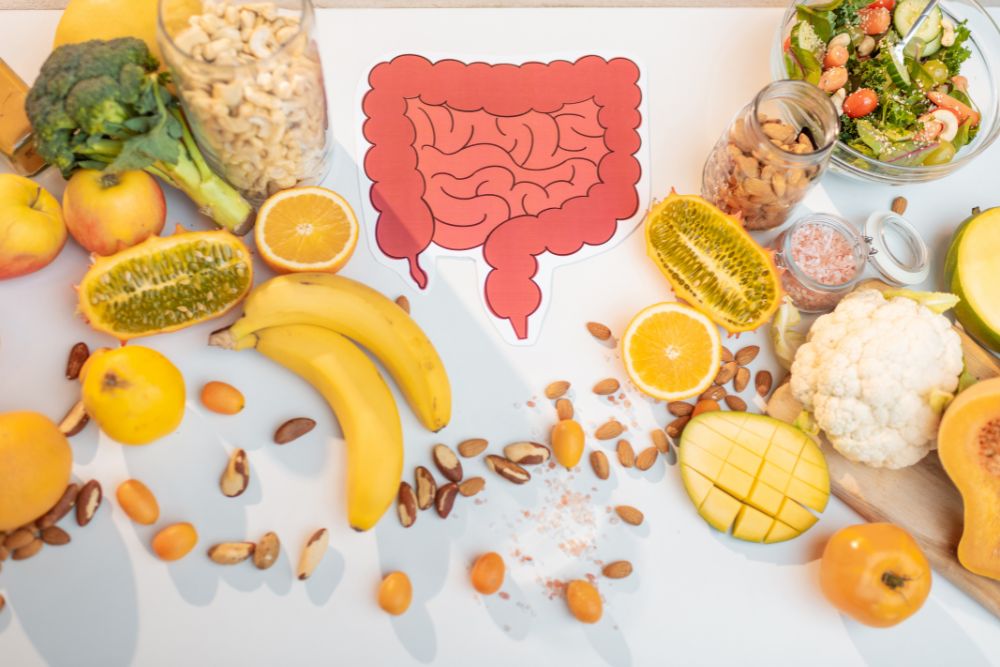
Your gut is like a garden inside your body, and just like any garden, it needs the right conditions to function properly.
Gut Health Vitamins play a crucial role in keeping your gut healthy and happy. In this article, we’ll explore the most important vitamins for gut health, how they work, and how you can make sure you’re getting enough of them.
We’ll also discuss how experts like our team at 121 Dietitian can help you create a personalised vitamin plan for optimal gut health.
Why Are Vitamins Important for Gut Health?
Before we dive into specific vitamins, let’s quickly recap why gut health is so important:
- Your gut helps digest food and absorb nutrients
- It plays a big role in your immune system
- It can affect your mood and mental health
- It helps control inflammation in your body
- It can influence your weight and metabolism
Vitamins are essential for many of these functions. They help your gut cells work properly, support your immune system, and even feed the good bacteria in your gut.
Key Vitamins for Gut Health
Here are some of the most important vitamins for maintaining a healthy gut:
Vitamin D
Vitamin D is often called the “sunshine vitamin” because your body can make it when your skin is exposed to sunlight. Its actually a hormone – you can read more about how amazing Vitamin D is here
It’s crucial for gut health because:
- It helps maintain the barrier function of your gut lining
- It supports your immune system, which is closely linked to gut health
- It may help reduce inflammation in the gut
You can get vitamin D from sunlight, fatty fish, egg yolks, and fortified foods. Many people in the UK need to take vitamin D supplements, especially during the winter months.
B Vitamins
B vitamins are a group of vitamins that play various roles in gut health:
- Vitamin B1 (Thiamine) helps your body break down carbohydrates
- Vitamin B3 (Niacin) helps your gut produce energy
- Vitamin B7 (Biotin) supports the growth of good gut bacteria
- Vitamin B9 (Folate) helps your gut cells grow and repair themselves
You can find B vitamins in whole grains, leafy green vegetables, eggs, and lean meats.
Taking supplements can seem like a good idea but tread carefully as too much and some can cause long-term nerve damage.
Vitamin C
Vitamin C is well-known for supporting the immune system, but it’s also important for gut health:
- It helps your body absorb iron, which is crucial for gut health
- It acts as an antioxidant, protecting your gut cells from damage
- It may help reduce inflammation in the gut
Good sources of vitamin C include citrus fruits, berries, peppers, and broccoli. Sticking to natural sources are preferred as Vitamin C supplementation can irritate the stomach.
Vitamin A
Vitamin A plays a key role in maintaining the lining of your gut:
- It helps keep the cells in your gut lining healthy
- It supports your immune system in the gut
- It may help reduce inflammation
You can get vitamin A from orange and yellow fruits and vegetables, leafy green vegetables, and liver. Just never eat a Polar bear’s click to find out why!
Vitamin K
Vitamin K is less well-known than some other vitamins, but it’s important for gut health:
- It helps your blood clot properly, which is important for gut health
- It may help reduce inflammation in the gut
- Some types of vitamin K are produced by the good bacteria in your gut
Good sources of vitamin K include leafy green vegetables, broccoli, and Brussels sprouts. Doubly important to eat your greens!

How to Ensure You’re Getting Enough Gut-Healthy Vitamins
Here are some tips for making sure you’re getting enough of these important vitamins:
- Eat a Varied Diet: Include plenty of fruits, vegetables, whole grains, and lean proteins in your diet.
- Consider Supplements: In some cases, you might need to take vitamin supplements. Always talk to a healthcare professional before starting any new supplements.
- Get Some Sunshine: Try to get some sunlight exposure each day for vitamin D, but remember to protect your skin from sunburn.
- Cook Foods Properly: Some vitamins can be destroyed by overcooking, so try to steam or lightly cook your vegetables when possible.
When to Seek Professional Help
While a balanced diet can provide most of the vitamins you need for gut health, sometimes you might need extra help. You should consider talking to a healthcare professional or a registered dietitian if:
- You’re experiencing persistent digestive issues
- You follow a restricted diet (like vegan or gluten-free)
- You have a condition that affects nutrient absorption
- You’re taking medications that might interfere with vitamin absorption
This is where experts like those at 121 Dietitian come in. As leading dietitians specialising in gut health and full body health, they can provide personalised advice on vitamins and gut health. They are experts in prevention as well as treatment.
They can help you:
- Assess Your Current Vitamin Intake: They can review your diet and lifestyle to see if you’re getting enough gut-healthy vitamins.
- Identify Potential Deficiencies: Through your symptoms and possibly blood tests, they can identify if you’re deficient in any important vitamins.
- Create a Personalised Vitamin Plan: Based on your individual needs, they can recommend dietary changes or supplements to support your gut health.
- Monitor Your Progress: They can track how your gut health improves as you optimise your vitamin intake.
- Provide Ongoing Support: Improving gut health is often a journey, and a dietitian can provide support and adjustments along the way.
At 121 Dietitian, we use evidence-based approaches to help you achieve optimal gut health. We understand that improving gut health isn’t just about taking supplements, but about creating a holistic plan that works for your individual needs and lifestyle.
Vitamins play a crucial role in maintaining a healthy gut. By ensuring you’re getting enough of these important nutrients through your diet and, if necessary, supplements, you can support your digestive system and overall health.
Remember, everyone’s gut is unique, and what works for one person might not work for another. If you’re concerned about your gut health or want personalised advice on optimising your vitamin intake for gut health, consider reaching out to the experts at 121 Dietitian.
With the right approach and support, you can harness the power of vitamins to improve your gut health and enjoy the many benefits that come with a happy, healthy digestive system.
If you’re struggling with gut health issues or want personalised advice on improving your gut health through diet and lifestyle changes, consider reaching out to us here at 121 Dietitian. Our team of registered dietitians can provide the guidance and support you need to achieve optimal gut health.
However, if you are not sure and want to dip your toe in the water first, Gillian Killiner has created a new series called “Invest in Your Health.”
The first course available is the GUT HEALTH COURSE which provides:
- 12 expert-led video tutorials from Gillian Killiner RD
- Written guides, recipes, and shopping lists
- Self-paced modules, completed in the comfort of your home
- Step-by-step support, including an elimination and reintroduction phase
If you want to book your programme TODAY we would love to help you.
You can book a 121 Dietitian Programme today by clicking on the link below
Links included in this description might be Amazon affiliate links. If you purchase a product or service with the links that I provide I may receive a small commission.
